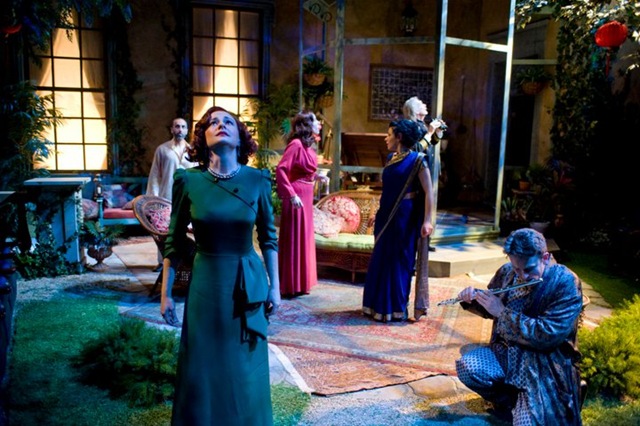 Life has been hectic since Mrs. T and I rushed my mother to the hospital last Wednesday for emergency surgery. We’d been planning to drive up to St. Louis on Thursday to see a show, which of course we didn’t do, and we expected for the same reason not to return to New York on Friday afternoon. But my mother, like so many veterans of the Great Depression, is much tougher than she looks, and it soon became evident that she was going to fool everybody and get better.
Life has been hectic since Mrs. T and I rushed my mother to the hospital last Wednesday for emergency surgery. We’d been planning to drive up to St. Louis on Thursday to see a show, which of course we didn’t do, and we expected for the same reason not to return to New York on Friday afternoon. But my mother, like so many veterans of the Great Depression, is much tougher than she looks, and it soon became evident that she was going to fool everybody and get better.
So I flew to New York on schedule, leaving Mrs. T and the rest of my family behind to hold the fort, and saw two shows on Saturday, the long-awaited press preview of Spider-Man: Turn Off the Dark (about which more on Wednesday) and a screening of The Importance of Being Earnest. That done, I caught the first flight back to St. Louis on Sunday morning, rented a car at the airport, and drove to Cape Girardeau to see my mother, who was now sitting up in a chair and chatting happily about her unexpected ordeal.
Not surprisingly, I haven’t had much time to read since arriving in Smalltown, U.S.A., nine days ago, but I did manage to knock off two books, Jon Ronson’s The Psychopath Test: A Journey Through the Madness Industry and Dominic Shellard’s 2003 biography of Kenneth Tynan. At first glance these books would seem to be ill matched, but they turned out to have a fair amount in common.
Ronson’s book is, not to put too fine a point on it, irksome. It’s also exemplary, a perfect example of what I think of as This American Life-type journalism, a genre in which the author views every aspect of life through the self-aggrandizing prism of his own tediously nebbishy personality. If Woody Allen had modeled himself on Tom Wolfe instead of Ingmar Bergman, he would have written books like The Psychopath Test. Part of what’s wrong with journalism today is that a great many journalists, were they to read that sentence out of context, would take it to be a compliment.
Kenneth Tynan, who in the Fifties was England’s most influential British drama critic, is no longer widely remembered, though those who know his work won’t need to be told that he was a writer of far greater accomplishment and significance than Jon Ronson. Yet Tynan, too, was self-centered in the extreme, and the more you learn about him, the less attractive he becomes, not just as a man but also as a critic.
Tynan summed up his critical point of view as follows:
One would have thought that the notion of an impersonal critic was as patently absurd as that of an impersonal person: yet playwrights still cherish it as a sort of holy ideal. Admittedly, we all make mystiques: but this one is particularly wishful. The man who asks for an anonymous, impersonal criticism is trying to elevate criticism to the status of a science; whereas it is, I am afraid, only an art. The critic’s business is to write readable English: the playwright’s to write speakable English. Beyond that it is every man for himself.
 It sounds plausible when put so elegantly, but at bottom Tynan is saying that criticism is pure opinion, and he went well out of his way to practice what he preached. He was, as a result, a wildly erratic critic, sometimes inspirational but at least as often arbitrary to the point of perversity, and it was his invariable custom to offer up his prejudices as though they were the revealed word. Thus it isn’t surprising that he was a power-seeker who longed desperately to work on the other side of the proscenium–indeed, Tynan abandoned criticism early on to become the first literary manager of the National Theatre under Laurence Olivier–and it’s downright funny to learn that the sharpest-tongued critic of his day was in private life a devotee of S&M who liked to spank his sex partners.
It sounds plausible when put so elegantly, but at bottom Tynan is saying that criticism is pure opinion, and he went well out of his way to practice what he preached. He was, as a result, a wildly erratic critic, sometimes inspirational but at least as often arbitrary to the point of perversity, and it was his invariable custom to offer up his prejudices as though they were the revealed word. Thus it isn’t surprising that he was a power-seeker who longed desperately to work on the other side of the proscenium–indeed, Tynan abandoned criticism early on to become the first literary manager of the National Theatre under Laurence Olivier–and it’s downright funny to learn that the sharpest-tongued critic of his day was in private life a devotee of S&M who liked to spank his sex partners.
I don’t think that criticism, or any other kind of journalism, should be impersonal, and I believe that the best critics are those who have professional experience in the art forms about which they write. But the journalist who thinks himself more interesting than his subject matter is almost always kidding himself, while the critic who uses his pulpit as a means to the end of personal power is a menace to the world of art.
I know that I’m not nearly modest enough, and that I, too, have been known to err in my own work on the side of self-aggrandizement. Not long ago my editor at The Wall Street Journal, who is a wise man, suggested that I might be slipping too far in that direction, and that I should do penance by spending a few weeks trying to keep the word “I” out of my theater reviews save when absolutely necessary. (I’m doing my best!)
Narcissism is, of course, the twin vice of critics and bloggers. I blog and tweet on the assumption–perhaps mistaken–that cyberspace is full of people who want to know what I think and how I live. Mrs. T, on the other hand, believes Twitter to be a collective exercise in rampant vanity. I hope she’s wrong, but even if she isn’t, I’m sure it’s good for me to be married to a woman who takes so skeptical a view of the value of public self-revelation. The world, I suspect, would be a better place if every professional writer were similarly blessed.

 The other day I took my mother for a drive through the flood-drenched lowlands of Illinois, east of the Mississippi River. It’s been years since I saw that part of the country under water, and the sight was alarming–as well as sobering.
The other day I took my mother for a drive through the flood-drenched lowlands of Illinois, east of the Mississippi River. It’s been years since I saw that part of the country under water, and the sight was alarming–as well as sobering. I’m not a fatalist, much less a quietist. Cardinal Newman summed up my view of things in The Dream of Gerontius: And, ere afresh the ruin on thee fall,/Use well the interval. The fact that we all live under the aspect of eternity has always struck me not as a reason for passivity but as a goad to action. That said, it was no less instructive that Mrs. T and I had to rush my mother to a hospital in Cape Girardeau for emergency surgery not two days after our visit to the floodlands.
I’m not a fatalist, much less a quietist. Cardinal Newman summed up my view of things in The Dream of Gerontius: And, ere afresh the ruin on thee fall,/Use well the interval. The fact that we all live under the aspect of eternity has always struck me not as a reason for passivity but as a goad to action. That said, it was no less instructive that Mrs. T and I had to rush my mother to a hospital in Cape Girardeau for emergency surgery not two days after our visit to the floodlands. Now that “Heartbreak House” is in the public domain, it can be performed with cuts, and Mr. Brown has tightened the script so shrewdly that you’ll have to look at the published version to see what got left out of his staging, which runs for about two hours and 45 minutes. He has also moved the action forward from 1914 to 1940 in order to give the play a more contemporary feel. It’s a clever touch, though my guess is that both of the world wars will seem equally alien to most of those who see this revival. Far more important is the skill with which Mr. Brown has balanced the play’s predominantly comic aspect with the sharp shock of the final scene, in which sirens wail and bombs descend on the country garden of the Shotovers, who respond with a horrific glee that symbolizes the death wish of their doomed class.
Now that “Heartbreak House” is in the public domain, it can be performed with cuts, and Mr. Brown has tightened the script so shrewdly that you’ll have to look at the published version to see what got left out of his staging, which runs for about two hours and 45 minutes. He has also moved the action forward from 1914 to 1940 in order to give the play a more contemporary feel. It’s a clever touch, though my guess is that both of the world wars will seem equally alien to most of those who see this revival. Far more important is the skill with which Mr. Brown has balanced the play’s predominantly comic aspect with the sharp shock of the final scene, in which sirens wail and bombs descend on the country garden of the Shotovers, who respond with a horrific glee that symbolizes the death wish of their doomed class.